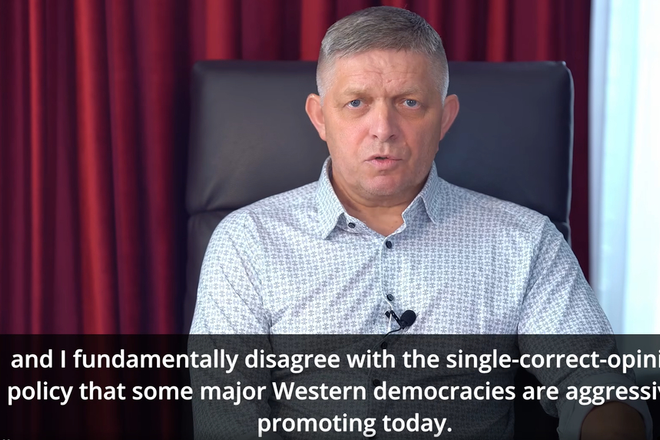A video featuring Prime Minister and Smer party leader Robert Fico appeared on the politician’s social media early evening on Wednesday, June 5. It is Fico’s first public appearance since he was seriously injured in a shooting attack after a government meeting in Handlová, western Slovakia, on May 15.
Fico describes his attacker, Juraj C., as “an activist of the Slovak opposition” and a “messenger of evil and political hatred”, alleging that he had tried to kill him because of his political views.
There is no evidence of any link between Juraj C. and the opposition, other than the attacker having attended some protest gatherings, and having stated that he does not support Fico’s government – something that he has in common with the more than 1.2 million people who voted in last September's parliamentary elections for parties that are now in opposition.
“I feel no hatred toward the stranger who shot me,” says the premier, visibly thinner and seated in a chair. “I forgive him.”
He pledged not to take any legal action against the man.
The video, titled “forgive and warn” and subtitled in English, was uploaded to Fico’s Facebook page three days before the European elections, and hours before the country enters a pre-election media moratorium, during which no campaigning or polls are allowed to take place or be published. According to the latest polls, Fico’s Smer party is likely to gain the largest share of the vote, in part thanks to an upswing in support since the attack.
In the video, Fico does not directly call on voters to support Smer in the elections, which take place on Saturday, June 8.
Fico goes on to say that his gunshot wounds have caused serious damage to his health. He does not provide any details (and official information about his health has otherwise been very limited). The attack left Fico with an injured hip, and he has lost part of his small intestine, according to the Denník N daily. He is currently recovering at home after spending just over two weeks at a hospital in Banská Bystrica, central Slovakia.
The premier estimates that he will return to work in early July.
Fico also blames Soros for the attack
In the 14-minute-long video, Fico pins most of the blame for what happened to him in May on what he calls the “anti-government” media that he says is financed by US billionaire George Soros, foreign non-governmental organisations, and the opposition.
“This opposition was unable to assess where its aggressive and hateful politics had led a section of society, and it was only a matter of time before a tragedy would occur,” the four-time premier opines.
He adds that all these actors will downplay the attack. In fact, numerous public figures, NGOs and representatives of what he calls the ‘anti-government’ media all publicly condemned the attack immediately after it happened. Fico fails to mention in the video.
The premier notes that he had repeatedly talked about the possibility of an attack on a Slovak government official, even communicating this fear to EU and NATO ambassadors in Slovakia.
“I had no intelligence reports. But my experience after 32 years in politics warned me,” he says in the video, suggesting that similar attacks will occur if the opposition does not change its ways and does not respect the elected government.
“The horror of May 15 will continue and there will be more victims,” he states.
In the monologue, he ignores threats that opposition leaders and the president have been receiving. Nor does he acknowledge that he has himself contributed to the divide in society thanks to the dehumanising language that he has long used to attack his opponents. For example, he has compared President Zuzana Čaputová to a rat.
And he hits out at the EU and western allies
As in the past, Fico also criticises the war in Ukraine and the EU, and talks about his government’s "sovereign" foreign policy.
He accuses several large western democracies and international organisations of being unable to accept other views. For example, he mentions his refusal to take illegal migrants in, his withdrawal of Slovak soldiers from Iraq, and his policy of halting Slovakia's military support for Ukraine. In his perspective, not all western democracies were “happy” about the aforementioned decisions.
“The right to a different opinion has ceased to exist in the EU,” says Fico.
He continues to criticise the EU for not standing up for the Smer-led opposition in the years 2020-2023 when, Fico alleges, the parties then in government tried to abuse the rule of law and eliminate the opposition.
“For large democracies, it was much more important than the rule of law to have political forces available in Slovakia that were and are ready to do anything for foreign interests, even if it is in direct contradiction to Slovakia’s national priorities,” Fico argues.
Nor is he happy about western democracies not criticising the Slovak opposition for what he protrays as its attacks on his government.
“Any violent and hateful excesses against legitimate governmental power [in Slovakia] are tolerated at the international level without any comment,” Fico asserts.


 Prime Minister Robert Fico made his first public appearance since the May 15 shooting in a video posted to his Facebook profile on June 5, 2024. (source: Facebook)
Prime Minister Robert Fico made his first public appearance since the May 15 shooting in a video posted to his Facebook profile on June 5, 2024. (source: Facebook)